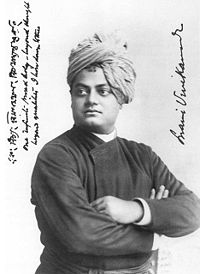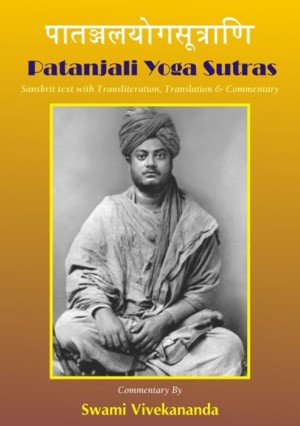25.तत्र निरतिशयं सर्वज्ञबीजम् ॥२५॥
tatra niratiśayaṁ sarvajña-bījam ||25||
In Him becomes infinite that all-knowing-ness which in others is (only) a germ.
The mind must always travel between two extremes. You can think of limited space, but the very idea of that gives you also unlimited space. Close your eyes and think of a little space, and at the same time that you perceive the little circle, you have a circle round it of unlimited dimensions. It is the same with time. Try to think of a second, you will have, with the same act of perception, to think of time which is unlimited. So with knowledge. Knowledge is only a germ in man, but you will have to think of infinite knowledge around it, so that the very nature of your constitution shows us that there is unlimited knowledge, and the Yogis call that unlimited knowledge God.
26.स एष पूर्वेषामपिगुरुः कालेनानवच्छेदात् ॥२६॥
sa eṣa pūrveṣām-api-guruḥ kālena-anavacchedāt ||26||
He is the Teacher of even the ancient teachers, being not limited by time.
It is true that all knowledge is within ourselves, but this has to be called forth by another knowledge. Although the capacity to know is inside us, it must be called out, and that calling out of knowledge can only be got, a Yogi maintains, through another knowledge. Dead, insentient matter, never calls out knowledge. It is the action of knowledge that brings out knowledge. Knowing beings must be with us to call forth what is in us, so these teachers were always necessary. The world was never without them, and no knowledge can come without them. God is the Teacher of all teachers, because these teachers, however great they may have been—gods or angels—were all bound and limited by time, and God is not limited by time. These are the two peculiar distinctions of the Yogis. The first is that in thinking of the limited, the mind must think of the unlimited, and that if one part of the perception is true the other must be, for the reason that their value as perceptions of the mind is equal. The very fact that man has a little knowledge, shows that God has unlimited knowledge. If I am to take one, why not the other? Reason forces me to take both or reject both. It I believe that there is a man with a little knowledge, I must also admit that there is someone behind him with unlimited knowledge. The second deduction is that no knowledge can come without a teacher. It is true as the modern philosophers say, that there is something in man which evolves out of him; all knowledge is in man, but certain environments are necessary to call it out. We cannot find any knowledge without teacher, if there are men teachers, god teachers, or angel teachers, they are all limited; who was the teacher before them? We are forced to admit, as a last conclusion, One Teacher, Who is not limited by time, and that One Teacher or infinite knowledge, without beginning or end, is called God.
27. तस्य वाचकः प्रणवः ॥२७॥
tasya vācakaḥ praṇavaḥ ||27||
His manifesting word is Om.
Every idea that you have in the mind has a counterpart in a word; the word and the thought are inseparable. The external part of the thought is what we call word, and the internal part is what we call thought. No man can, by analysis, separate thought from word. The idea that language was created by men—certain men sitting together and deciding on words, has been proved to be wrong. So long as things have existed there have been words and language. What is the connection between an idea and a word? Although we see that there must always be a word with a thought, it is not necessary that the same thought requires the same word. The thought may be the same in twenty different countries, yet the language is different. We must have a word to express each thought, but these words need not necessarily have the same sound. Sounds will vary in different nations. Our commentator says
“Although the relation between thought and word is perfectly natural, yet it does not mean a rigid connection between one sound and one idea.” These sounds vary, yet the relation between the sounds and the thoughts is a natural one. The connection between thoughts and sounds is good only if there be a real connection between the thing signified and the symbol, and until then that symbol will never come into general use. Symbol is the manifestor of the thing signified, and if the thing signified has already existence, and if, by experience, we know that the symbol has expressed that thing many times, then we are sure that there is the real relation between them. Even if the things are not present, there will be thousands who will know them by their symbols. There must be a natural connection between the symbol and the thing signified; then, when that symbol is pronounced, it recalled the thing signified. The commentator says the manifesting word of God is Om. Why does he emphasise this? There are hundreds of words for God. One thought is connected with a thousand words; the idea, God, is connected with hundreds of words, and each one stands as a symbol for God. Very good. But there must be a generalisation among all these words, some substratum, some common ground of all these symbols, and that symbol which is the common symbol will be the best, and will really be the symbol of all. In making a sound we use the larynx, and the palate as a sounding board. Is there any material sound of which all other sounds must be manifestations, one which is the most natural sound? Om (Aum) is such a sound, the basis of all sounds. The first letter, A, is the root sound, the key, pronounced without touching any part of the tongue or palate; M represents the last sound in the series, being produced by the closed lip, and the U rolls from the very root to the end of the sounding board of the mouth. Thus, Om represents the whole phenomena of sound producing. As such, it must be the natural symbol, the matrix of all the variant sounds. It denotes the whole range and possibility of all the words that can be made. Apart from these speculations we see that around this word Om are centred all the different religious ideas in India; all the various religious ideas of the Vedas have gathered themselves round this word Om. What has that to do with America and England, or any other country? Simply that the word has been retained at every stage of religious growth in India, and it has been manipulated to mean all the various ideas about God. Monists, Dualists, Mono-Dualists, Separatists, and even Atheists, took up this Om. Om has become the one symbol for the religious aspiration of the vast majority of human beings. Take, for instance, the English word God. It conveys only a limited function, and if you go beyond it, you have to add adjectives, to make it Personal, or Impersonal, or Absolute God. So with the words for God in every other language; their signification is very small. This word Om, however, has around it all the various significances. As such it should be accepted by everyone.
28. तज्जपः तदर्थभावनम् ॥२८॥
taj-japaḥ tad-artha-bhāvanam ||28||
The repetition of this (Om) and meditating on its meaning (is the way).
Why should there be repetition? We have not forgotten that theory of Samskaras, that the sum-total of impressions lives in the mind. Impressions live in the mind, the sum-total of impressions, and they become more and more latent, but remain there, and as soon as they get the right stimulus they come out. Molecular vibration will never cease. When this universe is destroyed all the massive vibrations disappear, the sun, moon, stars, and earth, will melt down, but the vibrations must remain in the atoms. Each atom will perform the same function as the big worlds do. So the vibrations of this Chitta will subside, but will go on like molecular vibrations, and when they get the impulse will come out again. We can now understand what is meant by repetition. It is the greatest stimulus that can be given to the spiritual Samskaras. “One moment of company with the Holy makes a ship to cross this ocean of life.” Such is the power of association. So this repetition of Om, and thinking of its meaning, is keeping good company in your own mind. Study, and then meditate and meditate, when you have studied. The light will come to you, the Self will become manifest.
But one must think of this Om, and of its meaning too. Avoid evil company, because the scars of old wounds are in you, and this evil company is just the heat that is necessary ot call them out. In the same way we are told that good company will call out the good impressions that are in us, but which have become latent. There is nothing holier in this world than to keep good company, because the good impressions will have this same tendency to come to the surface.
29. ततः प्रत्यक्चेतनाधिगमोऽप्यन्तरायाभवश्च ॥२९॥
tataḥ pratyak-cetana-adhigamo-'py-antarāya-abhavaś-ca ||29||
From that is gain (the knowledge of) introspection, and the destruction of obstacles.
The first manifestation of this repetition and thinking of Om will be that the introspective power will be manifested more and more, and all the mental and physical obstacles will begin to vanish. What are the obstacles to the Yogi?
 Swami Vivekananda
Swami Vivekananda
